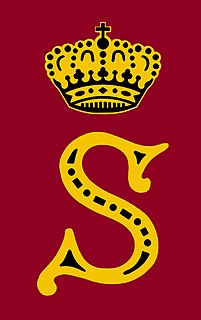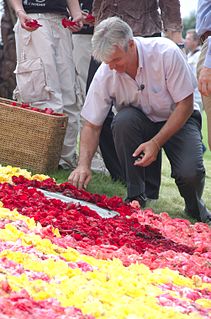
The politics of Belgium take place in the framework of a federal, representative democratic, constitutional monarchy. The King of the Belgians is the head of state, and the Prime Minister of Belgium is the head of government, in a multi-party system. Executive power is exercised by the government. Federal legislative power is vested in both the government and the two chambers of parliament, the Senate and the Chamber of Representatives. The federation is made up of (language-based) communities and (territorial) regions. Philippe is the seventh and current King of the Belgians, having ascended the throne on 21 July 2013.

Guy Maurice Marie Louise Verhofstadt is a Belgian politician who was the Leader of the Alliance of Liberals and Democrats for Europe from 2009 to 2019, and has been a Member of the European Parliament (MEP) from Belgium since 2009. He was the 47th Prime Minister of Belgium from 1999 to 2008, Deputy Prime Minister of Belgium from 1985 to 1992 and Minister of Budget from 1985 to 1992. He was a Member of the Chamber of Representatives from 1985 to 2009.

Open Flemish Liberals and Democrats, commonly known as Open VLD or simply as the VLD, is a conservative-liberal Flemish political party in Belgium. The party was created in 1992 from the former Party for Freedom and Progress (PVV) and politicians from other parties. The party led the government for three cabinets under Guy Verhofstadt from 1999 until March 2008. Open VLD most recently formed the Federal Government with N-VA, CD&V and the Francophone Reformist Movement (MR).

Socialist Party Differently is a social-democratic Flemish political party in Belgium. The party, formerly known as the Belgische Socialistische Partij (BSP) 1978–80 and the Socialistische Partij (SP) 1980–2001, emerged from the Belgian Socialist Party linguistic and community split in 1978 which also produced the Parti Socialiste; the Belgian Socialist Party was itself formed by former members of the Belgian Labour Party. From December 2011 to September 2014, sp.a was part of the Di Rupo Government, along with its Francophone counterpart Socialist Party (PS). Sp.a has been part of the Flemish Government several times.

Groen, founded as Agalev, is a green political party in Belgium. Its French-speaking equivalent is Ecolo; the two parties maintain close relations with each other.

The New Flemish Alliance is a Flemish nationalist, conservative political party in Belgium, founded in 2001 after it split from the People's Union. The N-VA is a regionalist, separatist movement that self-identifies with the promotion of civic nationalism. It is part of the Flemish Movement; the party strives for the peaceful and gradual secession of Flanders from Belgium. In recent years it has become the largest party of Flanders as well as of Belgium as a whole, and it participated in the 2014–18 Belgian Government until 9 December 2018.
People's Union was a Flemish nationalist political party in Belgium, formed in 1954 as a successor to the Christian Flemish People's Union.

Sociaal-Liberale Partij was a Belgian Flemish political party formed after dissolution of the moderate nationalist People's Union (Volksunie) party. Prior to 19 April 2008 it was known as Spirit, and intermediately as Flemish Progressives (VlaamsProgressieven). The party merged with Groen in the end of 2009, ceasing to exist.

Belgium is a federal state with a multi-party political system, with numerous parties who factually have no chance of gaining power alone, and therefore must work with each other to form coalition governments.

Vivant is a small social-liberal political party in Belgium founded by millionaire Roland Duchâtelet. In the regional elections in June 2004, the party formed a strategic alliance with the Flemish Liberals and Democrats (VLD). Both parties are founded on the principle of individualism and can be called liberal. In 2007, the party announced it would likely merge with the VLD.

Flanders is both a cultural community and an economic region within the Belgian state, and has significant autonomy.

The Senate is one of the two chambers of the bicameral Federal Parliament of Belgium, the other being the House of Representatives. It is considered to be the "upper house" of the Federal Parliament. Created in 1831 as a chamber fully equal to the Chamber of Representatives, it has undergone several reforms in the past, most notably in 1993 and 2014. The 2014 elections were the first without a direct election of senators. Instead, the new Senate is composed of members of community and regional parliaments and co-opted members. It is a chamber of the communities and regions and serves as a platform for discussion and reflection about matters between these federated entities. The Senate today plays a minor role in the federal legislative process. However, the Senate, together with the Chamber, has full competence for the Constitution and legislation on the organization and functioning of the Federal State and the federated entities. Since the reform of 2014, it holds about ten plenary sessions a year.

Flemish political parties operate in the whole Flemish Community, which covers the unilingual Flemish Region and the bilingual Brussels-Capital Region. In the latter, they compete with French-speaking parties that all also operate in Wallonia. There are very few parties that operate on a national level in Belgium. Flanders generally tends to vote for right-wing, conservative parties, whereas in French-speaking Belgium the socialist party is usually the most successful one.

Elections in Belgium are organised for legislative bodies only, and not for executive functions. Direct elections take place for the European Parliament, the bicameral Federal Parliament, the Parliaments of the Communities and Regions, the provincial councils, the municipal councils and a few district councils. Voting is mandatory and all elections use proportional representation which in general requires coalition governments.

Frederika Marie Joseph (Frieda) Brepoels is a Belgian politician of N-VA, mayor of Bilzen and former Member of the European Parliament for Flanders.
Geert Albert Bourgeois is a Belgian politician for the N-VA. July 2014 to July 2019, he was the Minister-President of Flanders. He previously worked as a lawyer at the Kortrijk bar, and served as a member of the Belgian federal parliament for the Volksunie (1995-2001) and for the N-VA (2001-2004).

Maurits Coppieters, Flemish politician for the Volksunie, member of the Belgian Chamber (1965–1971), the Belgian Senate (1971–1979) and the European Parliament (1979–1981).

Bert Jozef Herman Vic Anciaux is a Belgian politician, a founder and former member of Spirit. Served as Minister for Culture, Youth and Sport in the Flemish Government from 2004 until 2009, he was also Minister for relations with the Brussels-Capital Region and the Brussels Parliament.
Federal elections were held in Belgium on 25 May 2014. All 150 members of the Chamber of Representatives were elected, whereas the Senate was no longer directly elected following the 2011–2012 state reform. These were the first elections held under King Philippe's reign.

Federal elections were held in Belgium on 26 May 2019, alongside the country's European and regional elections. All 150 members of the Chamber of Representatives were elected from eleven multi-member constituencies.















